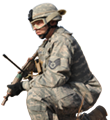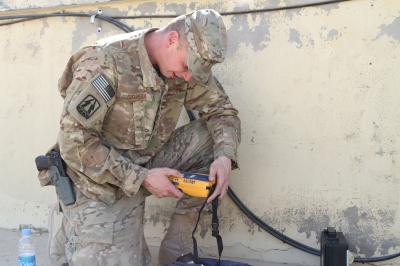Air Force Captain serves for community, to give back
| DMNA Home page | More News Stories |
Story by: 1st Sgt. Mary L. Williams - Regional Command (South) Public Affairs
Dated: Mon, Oct 7, 2013
KANDAHAR AIRFIELD, Afghanistan --“ When Capt. Michael Gielbeda joined the U.S. Air Force right out of high school, he was living a dream --“ lots of travel and didn’t want for anything. Yet, at the end of a four-year stint, he was thankful for the education and travel, and wanted to get back home.
So he did just that.
He ended his short military career, landed a job with a phone company as a telecommunication network engineer and settled into a comfortable life back home in Clifton, N.Y. - just a stone’s throw from Manhattan.
Then, the company was bought out by a larger phone company and Gielbeda found himself in a regular schedule, working the four to midnight swing shift - primarily in the Twin Towers, the centerpieces of the World Trade Center complex.
Gielbeda is a native New Yorker who had no intention of making the military a career when he was working on the eve of the Sept. 11, 2001 attack. Three months later, he rejoined the military.
“I still have my building identification badge, parking garage key and elevator keys,” he explained. “I was working in the World Trade Center Sept. 10 - got off at midnight.
“I was sound asleep when my phone went to ringing like crazy,” said Gielbeda, who was in his apartment in Queens. “At first, I ignored it and finally after so many calls, I answered. Everyone wanted to know if I was OK.”
Gielbeda said he looked out his window and could see the smoke, as he watched the aftermath of the attack unfold from his apartment window. With a five year break in service at the time, his immediate thought was how he could give back and help out right now.
“It was a feeling of anger, helplessness, and I was no longer in the military,” he said, remembering that morning vividly. “A few days go by and I get in touch with my company - my customers and some employees were lost.”
He supported the effort doing what he does best --“ working in an emergency fiber repair team to set up and stabilize communication.
“I thought I was doing something by helping with communication, but for me it just wasn’t enough,” he said.
“You couldn’t be happy, you just couldn’t,” Gielbeda said, thinking about how he felt. “I remember for months just having a sense of misery.”
Then he ran into a fellow co-worker who suggested he consider joining the National Guard - an option he had not thought of, “So I said, ‘I can help and do what I do’.”
That sealed the deal, and months later he was back in the military as an Airman in the New York Air National Guard, working as a communications engineer. And it wasn’t long after signing up he found himself deployed to the Middle East in a special operation supporting the war on terrorism.
“We got our bags and we were gone, there was no preparation,” he said, recalling how quickly they were mobilized and down range. “Our mission was to set up [communication networks] so everyone else could do their mission.”
Eventually, his sense of helplessness turned into mission accomplishment and a feeling of giving back.
“It felt like without us doing what we did, they couldn’t do what they did,” said Gielbeda, who is currently serving in Afghanistan on his fourth deployment. It was his second deployment to Iraq when he felt like he contributed a lot and solidified his commitment to continue serving.
“There were times when I’ve said, ‘What did I get myself into, I’m in this sandbox “ [no instant messaging] back then and limited contact with family back at home,’ but I wanted to help out,” he said. “Later I felt this really big sense of accomplishment --“ a sense of brother and sisterhood.”
Looking over his career, Gielbeda was at a pivotal point --“ he wanted to affect change so he sought his degree and pursued his new goal of becoming a commissioned officer.
“It took a lot of persistence and patience,” he says firmly. “My whole career, I’ve never quit at anything --“ it just takes will, time and patience.”
Today, Gielbeda is a commissioned officer, who is with the 105th Airlift Wing’s 213th Engineering Installation Squadron out of Stewart Air National Guard Base in Newburgh, N.Y. He is currently assigned to the 335th Signal Command (Theater), of East Point, Ga., at Kandahar Airfield as a cyber operations officer and the project engineer of communications for Regional Command South.
Though he hadn’t planned on making the military a career, Gielbeda, who spent 8 years as a noncommissioned officer, is in a comfortable place managing his civilian career and military obligation. The events that led him to re-enlist are the foundation for why he serves and, in remembrance he participates in the annual Tunnel to Towers run through the Brooklyn Battery Tunnel with the finish line at the World Trade Center site.
The event is a 5k run which started 12 years ago as a tribute to Stephen Siller, a New York City firefighter who ran through the tunnel on 9/11 with 60 pounds of gear on his back to respond to the terrorist attack and never made it out, he recites from memory.
Knowing he’d miss the run this year, Gielbeda contacted the Tunnel to Towers foundation via their website and explained who he is, that he is deployed and wanted to pursue a shadow run in Kandahar, Afghanistan.
He didn’t receive a timely response.
But when Sgt. Sharmella Andrews, noncommissioned officer in charge of logistics and supply for Detachment 33, 335th Signal Command, approached him about sponsoring a run, he instinctively thought about his efforts to contact the foundation and put her on a path to making it happen.
“When I told him I wanted to do a meaningful run he told me about Tunnel to Towers,” said Andrews. “From everything he said - he was passionate about it. I knew this was the event I wanted to coordinate and I used his contacts.”
Three days after the 12th anniversary of 9/11, Gielbeda and Andrews got their wish, and along with hundreds of others, participated in the Tunnel to Towers shadow run at KAF.
“I do this run back home every year that I’m in the area,” said Gielbeda, who participated in the 10-year anniversary run. “There was so much energy. Knowing Stephen’s story, there’s such a sense of positive energy.”
Asked what makes him strong and why he serves, Gielbeda explained the events of 9/11 and being a New Yorker - that ‘never give up’ mentality set in and made him strong.
“Now I have my little girl and she makes me strong,” added Gielbeda. “I want her to realize Daddy was doing it for her and this country.”
He now has a 15-year-military career under his belt and says it is a gratifying feeling for him to be giving back.
“People come into the military for different reasons. I make more money in my civilian job; here I’m away from my daughter,” Gielbeda said. “I do this because I’m doing something that is bigger than me, that’s why I do it.”
URL: https://dmna.ny.gov/news/?id=1381241935
216.73.216.208
Page Last Modified: Tue, Oct 8, 2013




